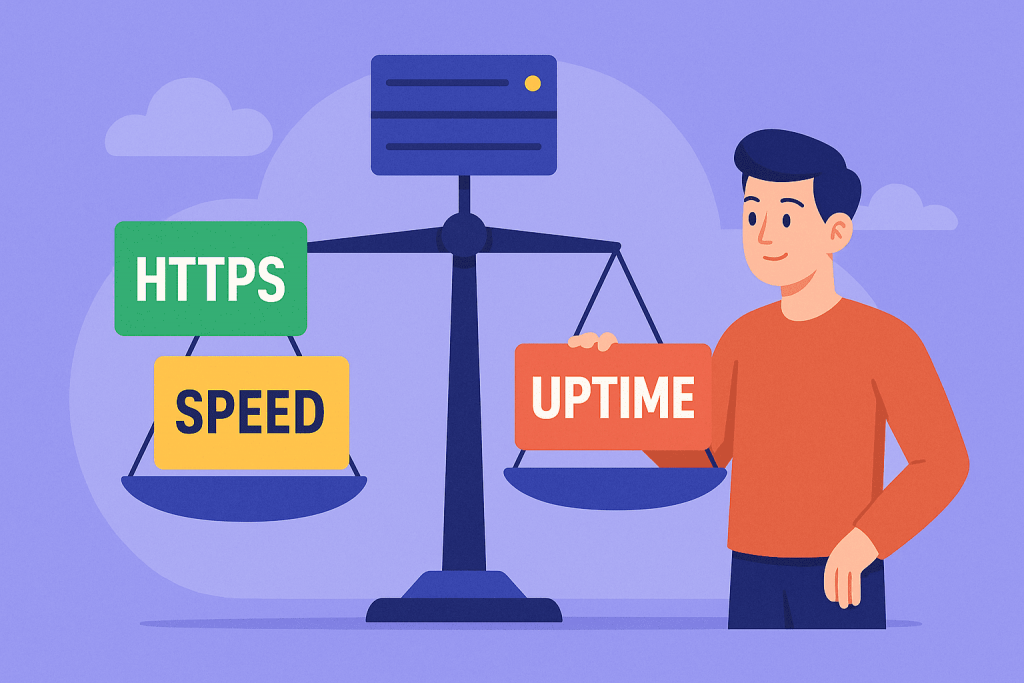
In today’s digital landscape, a business’s online presence is not a luxury — it’s a necessity. Your website is the foundation of your marketing strategy, and to ensure it performs well, you must pay attention to several technical aspects. Among the most important SEO factors are HTTPS, site speed, and stability. All three are directly influenced by the quality of your hosting.
In this article, we’ll explore why these factors are so important for SEO, how they are interconnected, and how RX-NAME can help you improve each one.
1. HTTPS — User Security and Search Engine Trust
What Is HTTPS?
HTTPS (HyperText Transfer Protocol Secure) is a secure version of HTTP. It encrypts data transferred between a user’s browser and your website server using SSL/TLS certificates.
Why Does HTTPS Matter for SEO?
- Google confirmed HTTPS is a ranking signal. Sites with SSL certificates rank better in search results.
- User trust depends on security. If the browser warns visitors about an unsecured site, they’re more likely to leave, increasing your bounce rate.
- Modern web functionality requires HTTPS. Features like geolocation, camera access, and push notifications only work with HTTPS.
How to Properly Enable HTTPS:
- Obtain a free or paid SSL certificate (e.g., Let’s Encrypt).
- Install the certificate via your hosting panel.
- Redirect all HTTP traffic to HTTPS using 301 redirects.
- Update all internal links and your sitemap accordingly.
RX-NAME offers free SSL certificates with most hosting plans and provides one-click installation.
2. Site Speed — A Key Factor for SEO and User Experience
Why Is Speed So Critical?
- Users expect fast loading times. 40% of visitors abandon a site that takes longer than 3 seconds to load.
- Google factors speed into rankings.
- Faster sites save resources and improve efficiency.
How Hosting Affects Speed:
- Storage type: SSD and NVMe are 10–20x faster than HDD.
- Server location: The closer the server is to your audience, the faster the page loads.
- Bandwidth capacity: Higher bandwidth ensures better data transfer speeds.
- Support for modern protocols (HTTP/2, HTTP/3): Allows faster and more efficient content delivery.
Speed Optimization Tips:
- Use a CDN (Content Delivery Network) to cache content globally.
- Compress images and minify CSS/JavaScript files.
- Enable server-side caching.
- Choose scalable hosting that adjusts to traffic surges.
RX-NAME provides fast SSD/NVMe-based hosting and CDN support to optimize performance.
3. Stability and Uptime — Keys to Trust and Ranking
Why Is Uptime So Important?
- Frequent downtime negatively affects SEO — search engines may lower your site’s ranking.
- If users can’t access your site, you lose potential customers.
- A stable website builds trust and credibility.
How to Ensure Stability:
- Choose a hosting provider that guarantees 99.9% uptime or higher.
- Set up automatic backups.
- Use uptime monitoring tools to detect issues instantly.
- For large projects, consider high-availability or clustered hosting solutions.
RX-NAME ensures over 99.9% uptime and provides automated backup systems for added reliability.
Additional Essentials
- 24/7 Support: Quick, expert assistance is critical when something goes wrong.
- Flexible Plans: Make sure your hosting scales as your website grows.
- Security Measures: Protection from DDoS attacks, antivirus, traffic filtering.
- Control Panel: An intuitive interface makes managing your site and server much easier.
Conclusion
Choosing reliable hosting is a long-term investment in your website’s success. The three core SEO pillars — HTTPS, speed, and stability — all depend on the quality of your hosting environment. Even the best design and content won’t help if your site is slow, unprotected, or constantly offline.
Choose trusted hosting from RX-NAME — with fast SSD/NVMe drives, free SSL certificates, high uptime, and expert support. Deliver an excellent user experience, build trust, and improve your position in Google search results.

Leave a Reply